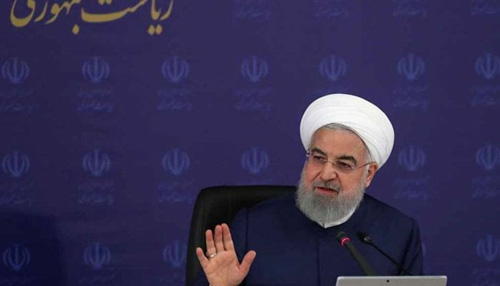Tehran
Iran said on Saturday that it cannot afford to shut down its sanctions-hit economy, even as the country’s novel coronavirus outbreak worsens with record-high death tolls and rising infections.
Iran must continue “economic, social and cultural activities while observing health protocols”, President Hassan Rouhani said during a televised virus taskforce meeting.
“The simplest solution is to close down all activities, (but) the next day, people would come out to protest the (resulting) chaos, hunger, hardship and pressure,” he added.
The Islamic republic has been struggling since late February to contain the country’s COVID-19 outbreak, the deadliest in the Middle East.
Health ministry spokeswoman Sima Sadat Lari reported Saturday that 188 people had died from the respiratory disease in the past 24 hours, raising the overall toll to 12,635.
Iran’s daily COVID-19 death toll has topped 100 since around mid-June, with a record single-day tally of 221 reported on Thursday. Lari also raised the country’s caseload to 255,117, with 2,397 new infections recorded. The outbreak’s rising toll has prompted authorities to make wearing masks mandatory in enclosed public spaces and to allow the hardest hit provinces to reimpose restrictive measures.
Iran closed schools, cancelled public events and banned movement between its 31 provinces in March, but Rouhani’s government progressively lifted restrictions from April to reopen its sanctions-hit economy.
Iran has suffered a sharp economic downturn after US President Donald Trump withdrew from a landmark nuclear agreement in 2018 and reimposed crippling sanctions.
The International Monetary Fund predicts Iran’s economy will shrink by six percent this year. “It is not possible to keep businesses and economic activities shut down in the long-term,” Rouhani said, emphasising that “the people will not accept this”.
Health Minister Said Namaki warned on Wednesday of a potential “revolt over poverty” and blamed US sanctions for the government’s “empty coffers”. The reopening of the economy “was not over our ignorance (of the virus’ dangers), but it was due to us being on our knees against an economy that could take no more”, Namaki said on state television.
US sanctions targeted vital oil sales and banking relations, among other sectors, forcing Iran to rely on non-oil exports, which have dropped as borders were closed to stem the spread of the virus.—AFP










